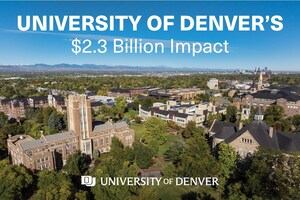Rethinking Colorado's Government: Principles and Policies for Fiscal Sustainability
DENVER, Oct. 3, 2011 /PRNewswire-USNewswire/ -- The University of Denver Strategic Issues Program today releases its report on Colorado's long-running fiscal crisis. The report, Rethinking Colorado's Government, represents a year of study by a non-partisan panel of 20 accomplished business, professional and community leaders drawn from across the state. The work was funded by the University as part of its ongoing commitment to the public good.
During its process, the panel received more than 30 presentations from officials, experts and advocates in government, business, labor, health care, academia and more. In addition to receiving presentations, panel members reviewed a wide range of written materials and held extensive discussions on key issues facing Colorado and other states. The enclosed report reflects the consensus of the University of Denver Strategic Issues Panel on State Government.
The report concludes that Colorado, like many other states, suffers from a cyclical and structural fiscal imbalance that undermines Colorado's fiscal stability over the long term. While Colorado's budget situation may slowly improve as the economy recovers, it is poised to founder once again at the next economic downturn. Given Colorado's fragile financial situation, the panel concluded that achieving a strong and sustainable fiscal environment requires a fundamental rethinking of traditional governmental practices.
"There are no simple answers, and this time, history does not seem to inform a clear path forward: the solutions of the past seem to be generally ineffective in the present," says DU Chancellor Robert Coombe. "Our panel concentrated on broad principles and on the structure of government, seeking to define changes that would enhance long term fiscal stability and at the same time be applicable to a variety of policy areas."
A copy of the full report, along with video presentations from experts who provided information to the panel, is available online at www.du.edu/issues.
"These principles do not offer simple solutions or quick fixes. The problems facing Colorado and other states will not be solved in a single stroke," says panel chair James Griesemer. "What the principles do provide are new ways to think about deeply-imbedded problems. They focus first on creating value for citizens rather than simply supporting bureaucracies and funding institutions. The principles reflect a faith in citizens to make sound choices. By encouraging government to demonstrate areas where value is being created they provide a means for building citizen support."
The University of Denver is committed to improving the human condition and engaging students and faculty in tackling the major issues of our day. DU ranks among the top 100 national universities in the U.S. For additional information, go to www.du.edu/newsroom.
Key Principles
To get past the gridlocked debates over fiscal policy, the panel proposed a set of principles for policy making that differ significantly from "business as usual" government. Taken together, the principles suggest the need for state government to:
- Reframe government; place citizens, rather than the institution of government, at the center of public discourse and decision making.
- Focus on value; shift the focus of government to creating measurable value for citizens instead of thinking in traditional institutional terms.
- Change the financial structure; use accountability centers to facilitate value assessment, dampen fiscal imbalance and highlight public subsidies.
- Foster competition; focus on outcomes, with the state acting as an enabler, not necessarily the provider, of public services.
- Leverage market forces; allocate resources based on citizen demand, focusing primarily on supporting individuals rather than operating institutions.
- Fully fund programs; align authority and responsibility in intergovernmental activities, eliminate unfunded mandates and fully fund annual state obligations.
Policy Implications
The final section of the report examines several key policy issues through the prism of these principles. The panel's goal was not to offer detailed policy prescriptions but rather to suggest how these principles might change the way major policy issues are viewed. The panel's conclusions in the areas of higher education, K-12 education, transportation, Medicaid, Amendment 23 and TABOR, summarized below, illustrate the point. Other areas addressed in the report include PERA, internal governmental services and executive compensation.
Higher Education: The importance of higher education and the bleak prospects for future funding caused the panel to suggest a new approach: The state should support college and university operations through a system of stipends, scaled to reflect student financial need, which builds upon the existing College Opportunity Fund infrastructure. The boards of Colorado's universities and colleges should be given the authority to manage each institution with minimal involvement by state agencies. Colorado's institutions of higher education should be allowed to succeed or fail based upon the value they create for students.
K-12 Education: Colorado's K-12 funding system is in the worst of all worlds– displacing funding for higher education and other priorities while still falling behind other states in per pupil funding. The panel saw the need for significant change and concludes: The state's role should be limited to defining and assessing outcomes and fully funding the K-12 program. Local school districts should be free to determine how best to achieve outcomes defined by the state. The state should fund students, not school districts, through stipends to students attending public schools. Citizens should be given information to judge the value being created by the state's K-12 program and individual school districts.
Transportation: Colorado's approach to funding transportation infrastructure is in need of reconsideration. To build public support the panel suggests a balance between user fees and taxes and recommends an intense focus on demonstrating citizen value, as follows: CDOT should use an accountability center structure linking defined revenue sources to specific service areas and clearly identify the degree to which tax subsidies and fees are used. The department should shift from a technical, production perspective to a focus on citizen value, presenting its public information in those terms.
Medicaid: The panel saw Medicaid both as an important public program and a serious financial risk and observes: The governor and legislature should study the best practices of other states and take full advantage of federal waivers to create an effective program while managing financial risk. Colorado taxpayers should be provided with value information related to Medicaid by the Taxpayer Value Council. Colorado should join with other states in urging the federal government to rethink Medicaid, redefine outcomes to be achieved and fund 100 percent of the cost of the federal program.
Amendment 23: While the panel is concerned about adequate funding for K-12 education, it believes Amendment 23 weakens the state's fiscal stability and concludes: Amendment 23 runs counter to principles of fiscal sustainability by increasing expenditure momentum and mandating expenditures without regard to the availability of revenue. Amendment 23 should be repealed.
TABOR: The panel found TABOR was neither a complete impediment to progress nor an unmixed blessing for Coloradans and concludes: TABOR reduces the state's ability to create a sustainable fiscal environment by substituting formulaic approaches for legislative judgment and prohibiting certain taxes irrespective of voter preferences. The sections in TABOR that require a vote of the people for new or increased taxes should be retained. The remaining provisions of TABOR should be repealed.
SOURCE University of Denver
WANT YOUR COMPANY'S NEWS FEATURED ON PRNEWSWIRE.COM?
Newsrooms &
Influencers
Digital Media
Outlets
Journalists
Opted In






Share this article